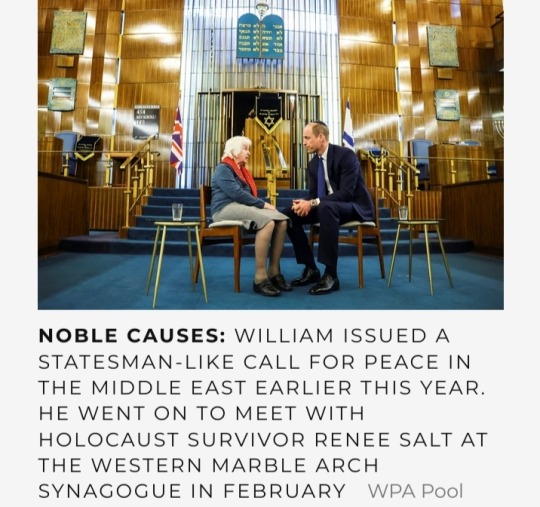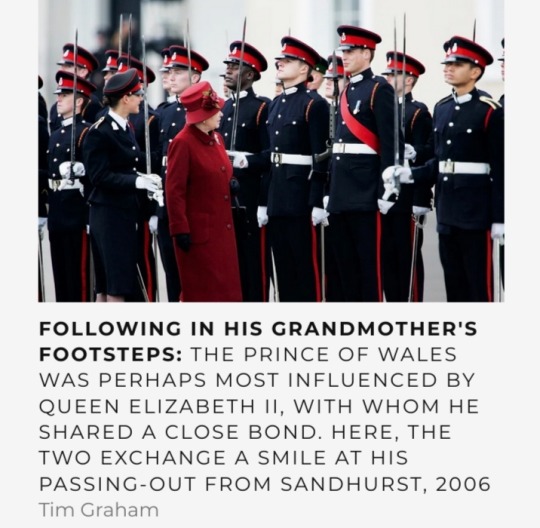#Sir Ephraim Mirvis
Text
Inside William’s Next Act: Tatler’s May issue goes behind the scenes as the Prince of Wales is rising above the noise — and playing the long game
The burden of leadership is falling upon Prince William, but as former BBC Royal Correspondent, Wesley Kerr OBE, explains in Tatler’s May cover story, the future king is taking charge
By Wesley Kerr OBE
21 March 2024

When I first met Prince William in 2009, he asked me if I could tell him how he could win the National Lottery.
It was a jokey quip from someone who has since become the Prince of Wales, the holder of three dukedoms, three earldoms, two baronies and two knighthoods, and heir to the most prestigious throne on earth.
He was, of course, being relatable; I was representing the organisation that had allocated Lottery funding towards the Whitechapel Gallery and he wanted to put me at ease.
William is grand but different, royal but real.
At 6ft 3in, he has the bearing and looks great in uniform after a distinguished, gallant military career.
He will be one of the tallest of Britain’s kings since Edward Longshanks in the 14th century and should one day be crowned sitting above the Stone of Scone that Edward ‘borrowed.’
William, by contrast, has a deep affinity with Scotland and Wales, having lived in both nations and gained solace from the Scottish landscape after his mother died.
He’s popular in America and understands that the Crown’s relationship to the Commonwealth must evolve.
The Prince of Wales has long believed that ‘the Royal Family has to modernise and develop as it goes along, and it has to stay relevant’, as he once said in an interview.
He seeks his own way of being relatable, of benefitting everybody, in the context of an ancient institution undergoing significant challenge and upheaval, as the head of a nation divided by hard times, conflicts abroad, and social and political uncertainty.
We might recognise Shakespeare’s powerful line spoken by Claudius in Hamlet: ‘When sorrows come, they come not single spies, but in battalions.’
With the triple announcement in January and February of the Princess of Wales’s abdominal surgery and long convalescence, of King Charles’s prostate procedure and then of his cancer diagnosis, the burden of leadership has fallen on 76-year-old Queen Camilla and, crucially, on William.

The Prince of Wales’s time has come to step up; and so he has deftly done.
In recent months, we have seen a fully-fledged deputy head of state putting into practice his long-held ideas, speaking out on the most contentious issue of the day and taking direct action on homelessness.
Last June, he unveiled the multi-agency Homewards initiative with the huge aspiration of ending homelessness, backed with £3 million from his Foundation to spearhead action across the UK.
He is consolidating Heads Together, the long-standing campaign on mental health, and fundraises for charities like London’s Air Ambulance Charity.
He was, of course, once a pilot for the East Anglian Air Ambulance services – a profession that had its downside: seeing people in extremis or at death’s door, he found himself ‘taking home people’s trauma, people’s sadness.’
Tom Cruise was a guest at the recent London’s Air Ambulance Charity fundraiser, William’s first gala event after Kate’s operation.
And more stardust followed when William showed that, even without his wife by his side, he could outclass any movie star at the Baftas.
There’s also his immense aim of helping to ‘repair the planet’ itself with his Earthshot Prize: five annual awards of £1 million for transformative environmental projects with worldwide application.
This project has a laser focus on biodiversity, better air quality, cleaner seas, reducing waste and combating climate change. Similar aims to his father; different means to achieve the goal.


On the issue which has caused huge convulsions – the Middle East conflict – William’s 20 February statement from Kensington Palace grabbed attention.
He said he was ‘deeply concerned about the terrible human cost of the conflict since the Hamas terrorist attack on 7 October. Too many have been killed.’
There were criticisms – along the lines of ‘the late Queen would have never spoken out like this’ or ‘what right does he have to meddle in politics?’ – but it was hard to disagree with his carefully calibrated words.
His call for peace, the ‘desperate need’ for humanitarian aid, the return of the hostages.
The statement was approved by His Majesty’s Government, likely cleared with the King himself at Sandringham the previous weekend and also backed by the chief rabbi of Great Britain, Sir Ephraim Mirvis.
Indeed, William and Catherine had immediately spoken out on the horrors of 7 October.
William followed up the week after his Kensington Palace statement by visiting a synagogue and sending a ‘powerful message’, according to the chief rabbi, by meeting a Holocaust survivor and condemning anti-Semitism.
This is rooted in deep personal conviction following William’s 2018 visit to Israel and the West Bank, says Valentine Low, the distinguished author of Courtiers and The Times’s royal correspondent of 15 years, who was on that 2018 trip.
‘William was so moved by his visit to Israel and the West Bank, he found it very affecting, and he was not going to drop this issue – he was going to pay attention to it for the rest of his life,’ says Low.
‘He must feel that… not to say something on the most important issue in the world [at that moment] would be a bit odd if you feel so strongly about it.’

There was concern from some commentators about politicising the monarchy, but this rose above the particulars of party politics.
As Prince of Wales, like his father before him, there is perhaps space to speak out sparingly on carefully chosen issues.
On this occasion, his views were in line with majority public opinion.
On homelessness, news came that same week that William was planning to build 24 homes for the homeless on his Duchy of Cornwall estate.
‘William’s impact is very personal,’ says Mick Clarke, chief executive of The Passage, a charity providing emergency accommodation for London’s homeless.
‘Two weeks before Christmas, the prince came to our Resource Centre in Victoria for a Christmas lunch for 150 people.
He was scheduled to stay for an hour, to help serve, wash up, and talk to people.
He ended up staying for two and a quarter hours, during which time he went from table to table and spoke to every single person.’
Clarke continues:
‘William has an ability to listen, talk and to put people at ease. During the November 2020 lockdown, he came on three separate occasions to help.
It gave the team a boost that he took the time; it was his way of saying: “I support you; you’re doing a great job.”’
Seyi Obakin, chief executive of Centrepoint, one of the prince’s best-known causes, adds:
‘People associate his patronage with the big moments like the time he and I slept under Blackfriars Bridge.
The things that stick with me are smaller in scale and the more profound for it – in quieter moments, away from the cameras, where he has volunteered his time.’
It is a different approach from the King’s.
As Prince of Wales, he was involved in the minutiae of dozens of issues at any one time, working into the night to follow up on emails, crafting his speeches, writing or dictating notes.
Add to that much nationwide touring over 40 years (after he left active military service in 1976), fitting in multiple engagements, often being greeted formally by lord lieutenants.
This is not William’s style. He has commended his father’s model, but he does things his own way.
Although patronages are under review, William has up till now far fewer than either his father or his grandparents.

Charles is sympathetic to William’s approach and his desire to make time with his young family sacrosanct.
They are confidantes, attested by the night of Queen Elizabeth’s death.
They were both at Birkhall with Camilla, reviewing funeral arrangements while the rest of the grieving family were nearby at Balmoral, hosted by the Princess Royal.
Charles has had almost six decades in public life and is the senior statesman of our time, with even longer in the spotlight than Joe Biden.
After Eton and St Andrew’s University, where he met Catherine, William served in three branches of the military between 2006 and 2013, finishing as a seasoned and skilled helicopter rescue pilot.
His later employment as an air ambulance pilot stopped in 2017, when he became a full-time working royal.
At that time, not so long ago – with Harry unmarried, Andrew undisgraced, and Philip and Elizabeth still active – William shared the spotlight.
Now, after the King, he’s the key man.
He can look back on the success of his first big campaign initially launched with his wife and brother in 2016: Heads Together.
‘We are delighted that Prince William should have become such a positive and sympathetic advocate for mental health through his Heads Together initiative and now well-established text service, Shout, among other projects,’ says the longtime CEO and founder of Sane, the remarkable Marjorie Wallace CBE.
‘It is not always known that he follows in the footsteps of his father, the King, whose inspiration and vision were vital in the creation of our mental health charity Sane.
As founding patron, he was instrumental in establishing our 365-days-a-year helpline and was a remarkable and selfless support to me in setting up the Prince of Wales International Centre for Sane Research.’
'Indeed,' says Wallace, 'this is where Prince William echoes the work of his father, showing the same ‘understanding and compassion for people struggling through dark and difficult times of their lives and has done much to raise awareness and encourage those affected to speak out and seek help.
We owe a huge debt to His Majesty and the Prince of Wales for their involvement in this still-neglected area.’
Just as I saw all those years ago at that early solo engagement in Whitechapel, William still approaches his public duties with humour and fun.
‘He defuses the formality with jocularity,’ says Valentine Low, citing two public events in 2023 that he witnessed.
In April last year, while on a visit to Birmingham, William randomly answered the phone in an Indian restaurant he was being shown around and took a table booking from a customer – an endearing act of spontaneity.
On his arrival later that day, the unsuspecting diner was surprised to be told exactly whom he had been talking to.

In October, Low reported, William ‘unleashed his inner flirt as he hugged his way through a visit with Caribbean elders [in Cardiff] to mark Black History Month.
As he gave one woman a hug – for longer than she expected – he joked: “I draw the line at kissing.”
And while posing for a group photograph, he prompted gales of laughter when he quipped: “Who is pinching my bottom?”’
Low believes that when William eventually becomes king, he will be more ‘radical’ than his father but wonders if people will respond to ‘call me William’ when ‘the whole point of the Royal Family is mystique and being different.’
However, William has thought deeply about his current role and is prepared for whatever his future holds.
For now, there is a decision to be made on Prince George’s secondary schooling. It’s said that five public schools are being considered, all fee-paying.
Eton is single-sex and boarding but close to home. Marlborough (Catherine’s alma mater) is co-ed and full boarding. And Oundle, St Edward’s Oxford and Bradfield College (close to Kate’s parents) are co-ed with a mix of boarding and day.
As parents, William and Catherine aspire to raise their children ‘as good people with the idea of service and duty to others as very important’, William said in an interview with the BBC in 2016.
‘Within our family unit, we are a normal family.’ Which may be one reason why he is so resistant to their privacy being compromised either by the media or close family members.

The 19th-century author Walter Bagehot wrote:
‘A family on the throne is an interesting idea also. It brings down the pride of sovereignty to the level of petty life… a princely marriage is the brilliant edition of a universal fact, and, as such, it rivets mankind.’
If hereditary monarchy is to survive, it must beguile us but also demonstrate its utility, that it is a force for good.
William said in that 2016 interview, ‘I’m going to get plenty of criticism over my lifetime,’ echoing Queen Elizabeth II’s famous Guildhall speech in 1992 ‘that criticism is good for people and institutions that are part of public life. No institution – city, monarchy, whatever – should expect to be free from the scrutiny of those who give it their loyalty and support, not to mention those who don’t.’
William saw close up his mother’s ability to bring public focus and her own personal magnetism to any subject or cause she focused on.
He admires his father’s work ethic, the way he ‘really digs down,’ sometimes literally (I understand that gardening is giving the King solace during his cancer treatment).
But the biggest influence for William was Her late Majesty, as he said on her 90th birthday.
As an Eton schoolboy, William made weekend visits to the big house on the hill, being mentored by Granny rather as she had been tutored in the Second World War by the then vice-provost of Eton, Sir Henry Marten.
William said in 2016:
‘In the Queen, I have an extraordinary example of somebody who’s done an enormous amount of good and she’s probably the best role model I could have.’
That said, his aim was ‘finding your own path but with very good examples and guidance around you to support you.'

Queen Elizabeth II had a brilliant way of rising above the fray and usually being either a step ahead of public opinion or in tune with it.
If you are at the helm of affairs in a privileged hereditary position, your duty is to serve and use your pulpit for the benefit of others.
In a democracy, monarchy is accountable.
The scrutiny is intense, with an army of commentators paid for wisdom and hot air about each no-show, parsing each announcement, interpreting each image.
William takes the long view. He has ‘wide horizons,’ says Mick Clarke.
‘There are so many causes that are more palatable and easier to achieve than ending homelessness, but his commitment and drive are 100 per cent.’
The prince seeks a different way of being royal in an ancient institution that must move with the times. His task? To develop something modern in an ever-changing world.
He faces all sorts of new issues – or old issues in new guises.
Noises off from within the family don’t help – Andrew’s difficulties, or the suggestions of prejudice from Montecito a couple of years ago (now seemingly withdrawn), which prompted William’s most vehement soundbite: ‘We’re very much not a racist family.’
William is maybe a new kind of leader who can keep the monarchy relevant and resonant in the coming decades.
Queen Elizabeth II is a powerful exemplar and memory, but she was of her time. William is his own man.
He must overcome and think beyond ‘the unforgiving minute.’
Indeed, he could seek inspiration in Rudyard Kipling’s poem, If.
If you can force your heart and nerve and sinew
To serve your turn long after they are gone,
And so hold on when there is nothing in you
Except the Will which says to them: ‘Hold on!’
If you can talk with crowds and keep your virtue,
Or walk with Kings—nor lose the common touch[…]
Yours is the Earth and everything that’s in it,
And—which is more—you’ll be a Man, my son!

This article was first published in the May 2024 issue, on sale Thursday, 28 March.
#Prince William#Prince of Wales#British Royal Family#Wesley Kerr OBE#Edward Longshanks#Homewards#Heads Together#London’s Air Ambulance Charity#East Anglian Air Ambulance#Tom Cruise#BAFTAS#Earthshot Prize#Kensington Palace#King Charles III#Sir Ephraim Mirvis#Valentine Low#Duchy of Cornwall estate#The Passage#Centrepoint#Birkhall#Sane#Marjorie Wallace CBE#Shout#Balmoral#Prince George#Walter Bagehot#Sir Henry Marten#Rudyard Kipling#If
146 notes
·
View notes
Text
According to Buckingham Palace, Rabbi Mirvis and King Charles spoke about ways to support interfaith harmony in the UK and their continued hope about a path to peace in Israel and Palestine.
Yesterday, a Palace spokesperson shared "This is a situation His Majesty is extremely concerned about, and he has asked to be kept actively updated. His thoughts and prayers are with all of those suffering, particularly those who have lost loved ones, but also those actively involved as we speak." King Charles also had private conversations with Israel's President Herzog and King Abdullah of Jordan.
4 notes
·
View notes
Text
Stood shoulder-to-shoulder in a crowd of 100,000 people in central London, a helicopter hovering above St James’s Park could be heard over the hushed crowd.
The hum was only a little louder than the rustling of winter coats and rhythm of feet along the pavement past old Fleet Street watering holes, less a march than a shuffle.
No flares were launched, no masks were worn. No vehicles were damaged and police acted as helpful hi-vis markers of the route, unburdened by the threat of violence.
The dozens of riot vans brought in from across the South East sat unused.
The 1,000 police on duty had an easy day’s overtime compared to the demonstrations of recent weeks.
“No, nothing at all. It’s been very calm,” one female officer told a protester who asked how her day was going.
One helped a bedraggled wayward jogger find his way out of the crowd and towards a less congested route.
More marshal than law enforcement
Another gave a child on his father’s shoulders a high-five, before getting a pat on the back and a thanks from a Jewish man wearing a Kippah.
Their role felt more marshal than law enforcement, with only two arrests made.
The biggest furore of the day was when Tommy Robinson appeared.
He was forced to leave by police, unwanted by the Jewish organisers of the event.

Boris Johnson, pictured above, received a much better reception, prompting cheers that broke the quiet when he arrived with wife Carrie and five-month-old Frank, chatting to demonstrators surrounding him.
David Baddiel, Judge Rob Rinder, Rev Richard Coles and Rachel Riley were all spotted in the hordes who had turned up to march against anti-Semitism along with the Chief Rabbi.
”Since Oct 7, on the streets of London, we have heard chants for jihad, for intifada and from River to the Sea,” said Sir Ephraim Mirvis.
“But today we stand on the same streets of London and say with regard to our precious hostages: Bring Them Home.”
He headed up the mass of people moving through the Strand and towards Parliament Square.
There was an awkwardness to the crowd’s chants. Many, on their first march, preferred to keep quiet than to join in the singing, with tunes dying out in moments.
‘It’s a bit tame! What do we chant?’
Some picked up last-minute Israeli flags on wooden sticks for £5 from outside Tube stations while others braved the drizzle wearing theirs like capes.
“It’s a bit tame, isn’t it? What do we chant?” wondered Olivia, a Jewish woman in her late 20s, there with her boyfriend and their friend.
Elsewhere, a mother pushing her baby in the pram walked her golden cocker spaniel puppy alongside.
Only when calls of “bring them home” began echoing around the streets did the heft of tens of thousands of people in mourning become apparent.
Three twenty-something men using a small megaphone led a rendition of Am Yisrael Chai. As hundreds join in, one jokes that he “does weddings too”.
They carried a banner stating “Failure to condemn Hamas is anti-Semitic”.
Another sign saying “Give me antipasti, not anti-Semitism” became a prop for protesters to pose with, while a child was heard reading another out loud “Spread hummus, not hate”.
Jews were supported by non-Jews. Six-year-old Claudia held her mother Antonia’s hand as the family joined the rally because they were “appalled that anti-Semitism has returned to Britain’s streets”.
Mark Elliott-Smith, a priest at Our Lady of the Assumption Warwick Street, said: “I thought I had to be here and show solidarity. I’ve been on a few of the demonstrations. When I wrote something about it [anti-Semitism], I was called ‘a Nazi priest’.”
‘I’d feel safer in Israel than in Britain’
Rev Coles, bringing up the rear of the protest, said he had joined because many of his Jewish friends now feel frightened to walk down the street. “I find that intolerable,” he said.
Rueben and Natalie, a young, Jewish, married couple with family in Israel came out to march.
Natalie said that she would “feel safer in Israel, even as the bombs are falling, than in Britain”, her husband nodding wearily. His three brothers live there already.
“At least in Israel you feel like the state is looking after us, that the police are there to protect you, that the whole nation is with you,” he said. “It doesn’t feel like that here.”
The protest culminated with speeches from political and religious leaders.
Anti-Semitism ‘a stain on our country’
The crowd’s reception to the speakers was muted at first, but immigration minister Robert Jenrick won over the crowd in Parliament Square, telling the thousands packed around Parliament that anti-Semitism “is a stain on our country”.
“Your government will not rest until each and every one of [the hostages] is back in the loving embrace of their families. We stand with Israel,” he went on.
Peter Kyle, there as member of the shadow cabinet and vice chairman of Labour Friends of Israel, spoke after Mr Jenrick warmed the crowds up.
“After the most shameful period in my party’s history, I am enormously proud of the leadership Keir Starmer has shown in combating anti-Semitism and standing up for the British Jewish community,” he said.
It was this that drew the biggest cheer of the afternoon, before the crowd went quiet again as they began their journey home.
Gideon Falter, the chief executive of Campaign against Antisemitism which organised the march, said: “The voice of decency has been heard today.”
#nunyas news#the stark contrast between the different events#is a reflection of the values behind the people in charge#of the different events
11 notes
·
View notes
Text
"What Israel is doing is the most outstanding possible thing," says UK’s chief rabbi
The UK’s Chief Rabbi, Sir Ephraim Mirvis, attended an event at Cranbrook Synagogue on Sunday, where he stated, “What Israel is doing is the most outstanding possible thing that a decent, responsible country can do for its citizens and its people.” Israel’s ongoing war has killed at least 23,210 Palestinians, including more than 9,000 children, with 59,167 wounded and over 7,000 missing, since 7 October.
2 notes
·
View notes
Text
Synagogue inaugurated in Abu Dhabi
The first synagogue to be built in the Gulf states was inaugurated recently as part of the Abrahamic Family House, which includes a church and a mosque. Visitors attending the ceremony in Abu Dhabi included UK Chief Rabbi Ephraim Mirvis and Bahrain politician Huda Nonoo. The Circuit reports:

Guests at the inaugural ceremony for the Moses Maimonides synagogue
The white-stoned mosque, church and synagogue anchoring the Abrahamic Family House, a monumental interfaith compound that was unveiled last week in the United Arab Emirates, will serve as a busy forum for promoting religious cooperation in the Middle East, its founders said.
The individual structures that make up the new complex, which was designed by the acclaimed Ghanian-British architect, Sir David Adjaye, are linked by a central exhibition space, public garden and conference center that will open to visitors on March 1. The project was inaugurated last Thursday in a twilight ceremony in the capital city of Abu Dhabi led by members of the UAE’s royal court and leaders of the three faiths.
“This will be a great convergence point for the world,” Rabbi Yehuda Sarna, the chief rabbi of the Jewish Community of the Emirates, said in a webcast address from the new synagogue’s podium on Friday. “It’s the kind of place where great religious leaders and great cultural leaders will come to be inspired,” he told members of the Association of Gulf Jewish Communities over Zoom.
Built in the new cultural district on Abu Dhabi’s Saadiyat Island across from the dome-covered Emirati branch of the Louvre museum, the prayer compound is visually striking: Its three cube structures are built with identical dimensions of 30 meters in height, width and depth, while distinguished by iconic design elements referring to each religion. Visible in the desert landscape from the island’s main road and lit up at night are giant posts beside each building that carry the symbols of a crescent, a cross and a menorah. Adjaye previously built the award-winning National Museum of African American History and Culture in Washington, D.C.
The UAE president, Sheikh Mohamed Bin Zayed, hailed the opening in a tweet, declaring the country’s strengthening commitment to religious tolerance.
Read article in full
16 notes
·
View notes
Link
Sir Ephraim Mirvis said few had been left untouched by the events that had unfolded and pledged solidarity with Israelis.
0 notes
Text
0 notes
Text
UK - ‘My coronation role will be small but significant’ says Chief Rabbi
News
Rabbi Sir Ephraim Mirvis praised the King’s sensitivity in ensuring the laws of Shabbat are observed prior to his contribution to Saturday’s historic ceremony
BY DAVID ROSEPOLITICS EDITORMAY 04, 2023 12:01
SHARE VIA
The Jewish Chronicle
CORONATION
KING CHARLES
ROYAL FAMILY
Chief Rabbi Sir Ephraim Mirvis (Getty Images)
Chief Rabbi Sir Ephraim Mirvis has paid tribute to the King’s…

View On WordPress
0 notes
Text
Sunak hosts Netanyahu amid disquiet over Israel’s rightwing coalition | Benjamin Netanyahu
Rishi Sunak will meet Benjamin Netanyahu in Downing Street on Friday, amid calls for him to do more to distance the UK from the Israeli prime minister and the extremism of his rightwing coalition government.
The chief rabbi in London, Sir Ephraim Mirvis, writing in the Jewish Chronicle, called for unity among British Jews as demonstrators prepared to gather in central London to protest at the…
View On WordPress
0 notes
Link
“Wrong theology in this area has been bound up with wrong action, giving legitimation for Christian support for persecution and discrimination of Jewish communities and eroding the recognition of Jewish people as neighbours whom Christians are bound to love … Christian communities may wish to consider whether there could be suitable opportunities in their public worship to focus and express repentance for Christian involvement in fostering antisemitism.”
“God’s Unfailing Word,” Church of England Faith and Order Commission , 2019
If it can be said that Europeans are today largely blind to Jewish aggressions, then Christians are among those fumbling around in deepest darkness. Historian Jonas Alexis once remarked that, contrary to older Christian anger at depictions of Jesus and Christianity in the Talmud, no such reactions are evident in relation to modern the Jewish comedy in which “Jesus, Christians and the cross are routinely mocked, even obscenely treated.”[1]
Jewish aggression against Christianity is, of course, nothing new. In the fifth century, edicts had to be pronounced banning Jews from burning and desecrating crosses, and Socrates Scholasticus reported in Historia Ecclesiastica that Jews had taken a Christian boy during Purim and crucified him.[2] In his Princeton-published Reckless Rites: Purim and the Legacy of Jewish Violence (2006), Elliott Horowitz pointed out multiple cases of Jews urinating on, and otherwise exposing their genitals to, crosses from 12th-century Germany and 13th-century England.[3] Even today, Daniel Rossing, a former advisor on Christian affairs to Israel’s religious Affairs Ministry, has commented on anti-Christian violence in Israel, which peaks during Purim. “I know Christians who lock themselves indoors during the entire Purim holiday,” he says. And yet, while Christians are spat upon and assaulted in Israel, and mocked and obscenely treated in the Diaspora, the majority of Christians remain among the most guilt-ridden and philosemitic of Europeans, applauding Zionist wars that kill their sons, and lauding a people that has done more than any other to overturn traditional Christian moral values. It is one of the most glaring contradictions in this age of contradictions.
The latest chapter in this sorry state of affairs is that the Church of England has, in its latest official treatise, decided to announce formal repentance to the Jews for centuries of putative injustices, as well as the Church’s unconditional adoption of Zionism. The Guardian explains:
Christians must repent for centuries of antisemitism which ultimately led to the Holocaust, the Church of England has said in a document that seeks to promote a new Christian-Jewish relationship. … The document, God’s Unfailing Word, is the first authoritative statement by the C of E on the part played by Christians in the stereotyping and persecution of Jews. Attitudes towards Judaism over centuries had provided a “fertile seed-bed for murderous antisemitism”, it said. Theological teachings had helped spread antisemitism, and Anglicans and other Christians must not only repent for the “sins of the past” but actively challenge such attitudes or stereotypes.
I must confess to an overwhelming fatigue when reading statements like this. They blend a profound historical ignorance with the most septic obsequiousness. The first instinct is simply to protest, and then to try to provide a litany of factual correctives. But I have carried out this Sisyphean task so many times, and in so many prior articles. I now find myself asking only why we should even offer explanations or responses to such accusations as “the part played by Christians in the stereotyping and persecution of Jews.” We owe nothing to the Jews. Any Christian intellectually and morally weak enough to be convinced that he does, probably isn’t worth the effort of convincing otherwise.
But how is it that yet another major Western institution has collapsed into White Guilt, in the process rendering itself pathetically pliable to Jewish manipulations? Having read God’s Unfailing Word, I argue that total Jewish dominance in the academic production of histories of the Jews and anti-Semitism has played a major role in shifting opinion in philosemitic directions. This has been amplified by Jewish activity in so-called “interfaith” dialogue, which has been ongoing internationally for over a century and has served Jewish interests exclusively while undermining Christian theology, especially those elements that made Christianity beneficial to Europeans in the past. This poisonous combination possesses lethal power because the Church of England is already in its death throes.
The Diseased Church
The publication of God’s Unfailing Word is reflective of the Church of England’s already-established position as the compliant lapdog of a GloboHomo master. The Church of England is one of the most homosexual-friendly denominations on Earth, going so far as to allow “gay clergy” to live with their partners in secular “civil partnerships.” In February 2018, the Church of England’s Education Office even published a policy supporting degenerate sex education among children which includes the statement that “Pupils should be taught that humans express their sexuality differently and that there is diversity in sexual desire.” Newcastle’s Anglican cathedral attracted attention in June, when it was revealed the church would host a weekend-long LGBT festival that included a panel discussion on “Queering the Church.” One of the four panelists was a Church of England curate who identifies as ‘non-binary genderqueer transgender.’ This is a church in the grip of terminal disease, and its policy on LGBT issues is unlikely to change the downward trajectory of its attendance, which has declined 1 percent/year in recent decades.
At the heart of this disease is the Archbishop of Canterbury and leader of the Church of England, Justin Welby, a man who looks like ten minutes of manual labor would actually kill him. He is the definition of all that is wrong in modern Man. Setting aside his uninspiring physical presence, Welby is a literal bastard, his mother Jane Portal having cuckolded her husband, the alcoholic Jew Gavin Welby (born Bernard Weiler) with her boss, Sir Anthony Montague Browne. The result of these chaotic origins is that Archbishop Welby/Weiler/Browne has fled entirely from any sense of meaningful identity, asserting in 2016: “I know that I find who I am in Jesus Christ, not in genetics, and my identity in him never changes.” If Welby limited himself to personal genetic oblivion there might not be a problem. A problem does, however, emerge, when Welby uses his position and influence to attack those who do pursue their interests. In 2016, when Nigel Farage told the press that sex attacks by migrants were “the nuclear bomb” of the EU referendum, Welby/Weiler/Browne told MPs in the home affairs select committee that he “utterly condemned” Farage for an “inexcusable pandering to people’s worries and prejudices, that is giving legitimization to racism.”
If that wasn’t bad enough, Welby/Weiler/Browne, who has confessed to struggling with his mental health, appears to have an almost Freudian desire to replace the Jewish father he thought he had with the current Chief Rabbi, Ephraim Mirvis. Welby/Weiler/Browne has taken to accompanying Mirvis on numerous excursions, echoing the Rabbi’s sentiments on almost every subject, and even arranging for Mirvis to provide the Afterword for God’s Unfailing Word. In his own Foreword to the same document, Welby/Weiler/Browne (one might call him Welby/Weiler/Browne/Mirvis) is glowing in his praise of Mirvis, and provides a delusional and ignorant elaboration of the history of Jewish-Christian relations:
In simple terms, the Church is being less than its true self when it refuses the gift of Christian–Jewish encounter. … Given the kindness, wisdom and scholarship of the Chief Rabbi, to count him among my friends is one of my greatest privileges. … Too often in history the Church has been responsible for and colluded in antisemitism — and the fact that antisemitic language and attacks are on the rise across the UK and Europe means we cannot be complacent. I reflected on this as I stood alongside other Christian leaders in ankle-deep snow within the camp of Birkenau in 2016, amid the ruins of the gas chambers. … The Chief Rabbi has opened, with characteristic honesty and affection, a challenge upon which we must reflect. We cannot do that reflection honestly until we have felt the cruelty of our history.
Such sickly musings are nothing new. In 2016, the Guardian reported:
The archbishop said Britain had a “shameful record” on antisemitism. “As a nation, we have to recognise that antisemitism has been the root and origin of most racist behaviour going back for the last thousand years in this country,” he said. “We have a shameful record until very recently, historically. It bubbles to the surface very easily indeed. When we see it, it tells us there are strains and stresses in society. It is the canary in the mine.” Welby also said that hate crime against Muslims had increased, fuelled by irrational fear that resulted in a high level of prejudice. Integration of Britain’s diverse population was a huge challenge, he said. “It’s been the biggest failure of the Church of England over the last 40 or 50 years, in terms of how we’ve dealt with integration.” It was a “great cause of shame”, he added.
In September, Welby/Weiler/Browne took his level of shame-promotion to an entirely new level when he prostated himself in front of crowds of amused and bemused Indians, apparently in supplication for a mass shooting by British troops that occurred in the garden of Jallianwala Bagh some 37 years before he was born.
Jewish Influence on God’s Unfailing Word
The Anglican tendency toward navel-gazing self-recrimination, which has assumed pathological proportions under the current Archbishop of Canterbury, has collided with Jewish dominance of the historical narrative. Jewish dominance in the academic production of histories of the Jews and anti-Semitism has played a significant role in shifting opinion in this instance. Notes at the end of God’s Unfailing Word reveal the document to rely heavily on ubiquitous, biased and factually dubious accounts of historical Jewish-Christian relations that have been written by Jewish academic activists (Jules Isaac [who was instrumental in orchestrating the pro-Jewish elements of Vatican II], Yehuda Bauer, Frederick M. Schweitzer, Marc Saperstein etc) or non-Jewish scholars who enjoyed lucrative and celebrated careers for their sympathetic portrayals of Jews (for example, the dreadful Gavin Langmuir).
Looked at objectively, this reliance in itself is maladaptive in the extreme. One struggles to find an equivalent case in history where one of two feuding parties fails to chronicle its own struggles, later adopts the narrative of the opponent, and thereby comes to perceive its entire history through the eyes of the opposing side. By way of explanation, we could suppose that the Church of England’s Faith and Order Commission desired an academic gloss for its theological musings and, since Jews and philosemites dominate the mainstream discussion of Jewish history and anti-Semitism, the Commission was forced to turn to Jewish sources. I don’t think this is a full explanation by any means, but it does provide some insight into the flow of ideas and intellectual influence, and should point to academia as one of the most important areas that must be contested if the West is to survive.
Even without its highly revealing endnotes, Jewish intellectual fingerprints are all over God’s Unfailing Word, where they catastrophically combine with a flamboyant Anglican penchant for weakness and subservience. The primary stated objectives of the document are essentially Jewish, being that of “challenging antisemitism,” and “working together [with Jews] for the common good of our society.” Of course, working with Jews for ‘the common good of our society” invariably means the familiar recipe of “fighting racism,” “rejecting homophobia,” “rooting out anti-Semitism,” and campaigning on behalf of migrants and ethnic minorities. In other words, Christian “tolerance,” always a volatile and deeply problematic virtue, has been weaponized in modernity as a primary engine for self-dispossession, pathological altruism, perverse virtue signaling, and moral self-flagellation.
Irrational shame, of the type exemplified and promoted by Welby/Weiler/Browne, saturates the pages of God’s Unfailing Word. The text, which purports to consist of “Theological and Practical Perspectives on Christian–Jewish Relations,” is remarkably one-sided. You will search in vain for references to the Jewish trade in Christian slaves, or the mass practice of exploitative usury. You won’t see any consideration of the impact of Jewish dissemination of pornography or the general degrading of morals. You will turn from page to page without encountering any mention of Jewish contempt for Christianity, and historical and contemporary violence against Christians. What you will instead find are multiple references to the assumption that “the Christian–Jewish relationship is a gift of God, endless rumination on “the persecution and prejudice experienced by Jewish people through history,” the blunt declaration that “antisemitism is a virus that may appear dormant but can all too easily be reactivated in all kinds of contexts,” and “the Church, which should have offered an antidote, compounded the spread of this virus.” [The concept of anti-Semitism as a virus, now clearly rampant in the Christian churches, is a Jewish contrivance. See here for further discussion.]
God’s Unfailing Word promotes nothing more than nicely packaged Jewish ideas, including the notion that there should be a “recognition on the part of the Church that it bears a considerable measure of responsibility for the spread of antisemitism,” and demands “repentance, for we are rightly reminded of the burden of responsibility the Christian tradition bears for its teaching of contempt over the ages.” Jews are completely absolved of any responsibility for anti-Semitism, and any idea they may have engaged in provocative or antagonistic behaviors, their only role being one of “grave suffering and injustice.” In order to address this assumed state of affairs, God’s Unfailing Word effectively redefines the theological and dogmatic positions of the church in much the same way as the Catholic Church did with the 1965 Second Vatican Council declaration Nostra Aetate.
A Redefined Theology
The Church of England now affirms that there has been a “difficult history” involving Jews and Christians, but only in the sense that Christians have contributed to “grave suffering and injustice.” The Church will henceforth teach that Christians “have used Christian doctrine in order to justify and perpetuate Jewish suffering.” Furthermore, they have “fostered attitudes of distrust and hostility among Christians towards their Jewish neighbours, in some cases leading to violent attacks, murder and expulsion.” Christians today must “reject such misuses of Christian doctrine” and engage in “repentance for the sins of the past.” This new theological approach, which raises White Guilt to the position of dogma, is explicitly explained as adapting to “scholarly research, particularly since the Second World War.” This is, of course, refers to the products of Jewish academic activism.
The historical narrative underpinning the new theology is laughable in its naivete. The mass presence of crypto-Jewish networks in 15th-century Spain, for example, which mainstream scholarship has established at one point threatened to overcome and infiltrate even the Jesuit Order, is held up merely as an example of the fact “the Church has never been without Jewish members.” Suspicion of Jews is argued to have been rooted less in the insincerity of Jewish converts than in “the underlying structure of antisemitism.” The authors of God’s Unfailing Word avoid further digression on Jewish behavior, for reasons one can surmise with little effort.
The section of the document concerning anti-Semitism is awful. It begins by pointing out that the Church of England’s College of Bishops accepted the International Holocaust Remembrance Alliance (IHRA) definition of antisemitism with its examples in September 2018. The document explains:
The examples highlight the way that antisemitism tends to weave together four interconnected claims, all of which should be vigorously resisted: (a) that there is something inherently wrong with Jews as a people; (b) that Jews always seek to control and influence others; (c) that because there is something inherently wrong with Jews, this influence is inevitably to the detriment of those others; (d) that therefore those with authority have a duty to restrict so far as possible the scope for Jews to exercise any influence over others.
The authors of God’s Unfailing Word insist that although “these pernicious claims appear in secular forms of antisemitism, … it is also clear that theological ideas have been used to support them in church contexts, thereby contributing to the persistent grip of the ‘virus’ of antisemitism.” Christians should mourn that “centuries of Christian government in European history include a long catalogue of anti-Jewish measures, such as legal discrimination and periodic expulsion, alongside bouts of communal violence leading in some cases to the massacre of entire communities.” Martin Luther, without whom the Church of England would not exist, is castigated because he “described [Jews] as demonic and called for the burning of synagogues.” England, meanwhile, is condemned as “the birthplace of what became known as the ‘blood libel.’ … England became the first country to order the entire Jewish community to leave, thereby seeking to be a Christian territory with no Jewish presence.”
The document then explains a total adoption of the perspective of the Jewish historical and activist Jules Isaac who, in 1947, began to wage a campaign designed to promote specific recommendations in Christian churches, mainly the Catholic Church, for the “purification” of Christian teaching regarding the Jews. The Church of England Faith and Order Commission adds:
Jules Isaac, who wrote on Jewish–Christian relations in the aftermath of the Second World War, saw a profound link between historic Christian anti-Judaism and the eruption of antisemitism in the twentieth century. If the first premise of antisemitism is the perception that ‘there is something inherently wrong with the Jews as a people’, then traditional Christian teaching that the Jewish people are collectively responsible throughout time for the death of the divine Christ, and therefore guilty together of deicide, imbues it with a terrible power. Isaac coined the phrase ‘the teaching of contempt’ (enseignement du mépris) to describe what he saw as key features of Christianity’s sustained hostility to Judaism from earliest times.
Christians are now impelled to apologize for this “teaching of contempt,” and engage in “ecclesial repentance for complicity with the evils of antisemitism.” The Church of England insists that “such ideas should have no place in Christian teaching and belief.” Christian communities are urged “to consider whether there could be suitable opportunities in their public worship to focus and express repentance for Christian involvement in fostering antisemitism, for instance in relation to observance of Holocaust Memorial Day.”
The cathedrals of Norwich and Lincoln have for centuries displayed stained glass windows depicting the boy martyrs William of Norwich and Hugh of Lincoln, both found murdered, and both determined by contemporary investigators to have been murdered by one or more Jews. The authors of God’s Unfailing Word now take some pride in pointing out that supplementary notifications have been placed near these windows, explaining them as:
a shameful example of religious and racial hatred, which, continuing down through the ages, violently divides many people in the present day. Let us unite, here, in a prayer for an end to bigotry, prejudice and persecution. Peace be with you: Shalom.
From here, the Church of England moves to retreat from any theological claim that Christians might be God’s “chosen people.” For fear of placing Jews outside salvation, the Anglican Church now insists on a bizarre ‘acknowledgement of mystery regarding the claims of Jewish people,” which is a vague and cowardly method of asserting that “Jewish people since the coming of Christ nonetheless remain recipients of God’s promises.” Of course, this is necessarily a theology that makes the coming of Christ utterly redundant, since God’s promise can be fulfilled without a Messiah. The only explanation offered for this wholesale abandonment of Christian doctrine is that Christianity “carries a heavy burden of responsibility for antisemitism and its lethal consequences,” and “it has to accept that there is a mystery here that transcends its understanding in history, though its meaning will be revealed at the end of time.” This is perhaps the greatest ever example of “kicking the can down the road.”
Christian teaching is to be adapted in several areas in order to avoid insulting or stereotyping Jews. For example, there is a clear retreat from the position that the Old Testament serves as an obvious prophecy of the coming of Christ:
Those who teach and preach in the Church of England should avoid implying that the meaning of Old Testament prophecy points to Christ in such a direct and obvious way that anyone who denies it must be refusing to pay attention to the text or be somehow defective in their understanding. Such implications feed directly into the negative stereotyping of Jewish people that forms the fundamental structure of antisemitism.
As part of the Church of England’s fundamental revision of theology, God’s Unfailing Word also articulates a new orientation in relation to Israel. This new orientation is profoundly Zionist, even going so far as to insist that “the approaches and language used by pro-Palestinian advocates are indeed reminiscent of what could be called traditional antisemitism, including its Christian forms.”
Conclusion
Perhaps the most ironic aspect of God’s Chosen Word is that it isn’t good enough for the Chief Rabbi, who ruminates on the putative blameless nature of his ancestors in his Afterword:
As for my ancestors, their interaction with Christianity meant being faced with the brutality of the Crusades; it meant being forced to choose between converting to Christianity or certain death; it meant false accusations of sacrificing Christian children at Passover to obtain blood for matzah in what became the cruel Blood Libel; it meant requiring the great Rabbinic leaders, including a figure no less than the Ramban (Nachmanides, 1194–1270), to publicly defend their faith against prominent priests as part of the ignominy of the Disputations, resulting in censorship, violence and slaughter.
Mirvis acknowledges and celebrates “the document’s honest appraisal of the destructive nature and origins of Christian perceptions of the Jewish people,” but he expresses a “substantial misgiving … , despite the progress it undeniably represents and articulates. Namely, that it does not reject the efforts of those Christians, however many they may number, who, as part of their faithful mission, dedicate themselves to the purposeful and specific targeting of Jews for conversion to Christianity.”
In other words, the meaning of so-called “inter-faith dialogue” is the same as that of multiculturalism—Whites/Christians must forever make room for Jews and others. They must engage in endless groveling apologies. And they must never try to convert others or attempt to imply that they should acculturate to their norms. In short, the best position for Whites, in the eyes of Rabbi Mirvis, is crawling on their bellies like his good friend Mr. Welby.
That’s not my style. I think I’ll stick with the historical reality of Christian-Jewish interactions over the centuries, a reality that leads naturally to the teaching of contempt.
0 notes
Text
Two teenagers have been arrested by Israeli police investigating an attack on a Christian cemetery in Jerusalem.
Police said the pair were aged 14 and 18 and came from central Israel.
They said gravestones at the historic Protestant Mount Zion Cemetery had suffered extensive damage from an "act of intentional vandalism".
Israel's Anglican Church, Jewish leaders and faith leaders from the UK all condemned Sunday's attack.
Security camera footage shows two young men pushing over a gravestone in the shape of a cross and smashing others. They are wearing kippahs, or skullcaps, and knotted fringes known as tzitzit on their clothes, indicating they are religious Jews. More than 30 graves were damaged at the site close to Jerusalem's Old City.
Other than giving their ages and a rough location of where they were from, Israeli police did not say any more about the suspects.
Anglican Archbishop Hosam Naoum said he was dismayed and saddened by the attack, which he said seemed to be part of a trend. "We have noticed that hatred speech and hatred crimes are on the rise," he said on a visit to the cemetery on Wednesday.
The British Consulate in Jerusalem called it "the latest in a string of attacks against Christians and their property in and around the Old City".
The Archbishop of Canterbury, Justin Welby, the most senior cleric in the Church of England, called the desecration of the graves "a blasphemous act", while the UK's Orthodox Chief Rabbi Sir Ephraim Mirvis said: "This shameful vandalism is a disgraceful desecration for which I hope the perpetrators will be found and prosecuted to the fullest extent of the law."
Israel's foreign ministry also condemned what it said was an "immoral act" and "an affront to religion".
The cemetery was set up in 1848 and is looked after by the Lutheran and Anglican communities.
Among those buried there are scientists, politicians, members of the armed forces and clergy, many of whom were prominent figures in the holy city.
10 notes
·
View notes
Text
UK's holocaust memorial should serve as a warning to future generations say survivors as designs are considered ... - Daily Mail
Daily Mail UK's holocaust memorial should serve as a warning to future generations say survivors as designs are considered ... Daily Mail ... Victoria & Albert Museum in London for the public to give their views. A jury, including London Mayor Sadiq Khan, Communities Secretary Sajid Javid and chief rabbi Ephraim Mirvis, will then decide which design is to be made a reality. Sir Peter ... and more »
0 notes
Text
Press release: Britain honours its Holocaust heroes
At an event at the Foreign Office hosted with the Israeli embassy, the Foreign Secretary Boris Johnson, Communities Secretary Sajid Javid, Archbishop of Canterbury Justin Welby, Chief Rabbi Ephraim Mirvis and Israeli Ambassador Mark Regev, will gather to honour heroic men and women with the British Hero of the Holocaust Medal.
The award, whose previous recipients include Sir Nicholas Winton, recognises those Britons who undertook extraordinary acts of courage and self-sacrifice, in order to help Jewish people and others.
Foreign Secretary Boris Johnson said:
The moral conviction and bravery of the British Heroes of the Holocaust should fill us with pride.
These exceptional individuals saved hundreds of lives and went above and beyond the call of duty in the most difficult circumstances to do the right thing.
As a government we are committed to ensuring that society learns the lessons of the Holocaust so that bigotry and prejudice are given no place to take root.
Communities Secretary Sajid Javid said:
Nazi oppression was defeated not only through military force but also through quiet acts of courage and compassion.
These eight individuals are true British heroes and a source of national pride for us all, fully deserving of our lasting respect and lifelong gratitude. Their willingness to stand up to hate with often little regard to their own personal safety is an inspiration to us all.
Award Recipients
The eight recipients of the award are:
British Diplomats John Carvell and Sir Thomas Preston who issued almost 1500 Jews with certificates to enable them to escape to Palestine. Margaret Reid who worked in the Passport Control Office of the Berlin Embassy and issued visas that allowed thousands of Jews to emigrate. She often bent the rules for issuing visas, a practice that was deliberately overlooked by the British Consul-General Sir George Ogilvie-Forbes, another recipient of the award;
Academic Doreen Warriner and Trevor Chadwick who worked closely with the ‘British Schindler’ Sir Nicholas Winton in Prague to organise the evacuation of hundreds of Jewish children from the then Czechoslavakia to Britain.
Dorothea Weber (née LeBrocq) who sheltered her Jewish friend Hedwig Bercu during the German occupation of the Channel Islands at great personal risk. She was aided by a German soldier, Kurt Ruemmele, whom she married after the war and;
Otto Schiff who helped to create the Jewish Refugees Committee which arranged to bring Jews out of Germany and Austria to Britain during the war, as well as supporting them financially once here.
This Government is determined that the genocide of six million Jews will never be forgotten. That is why it will be building a spectacular and poignant Holocaust Memorial and Learning Centre, right next to Parliament, reminding all of us of the depths to which humanity can sink, and the importance of robustly opposing all forms of bigotry. Holocaust Memorial Day 2018 will take place on Saturday 27 January with thousands of activities and events taking place across the country at community centres, schools, libraries, museums, arts venues, prisons and places of worship.
Further information
Follow the Foreign Secretary on Twitter @BorisJohnson and Facebook
Follow the Foreign Office on Twitter @foreignoffice and Facebook
Follow the Foreign Office on Instagram, YouTube and LinkedIn
Follow the Ministry of Housing, Communities and Local Government on Twitter @MHCLG
Media enquiries
For journalists
Email [email protected]
Newsdesk 020 7008 3100
from Announcements on GOV.UK http://ift.tt/2Dyd7VN
via IFTTT
0 notes
Text
Competing designs for the UK’s new Holocaust Memorial and Learning Centre
It’s the last chance to have your say on the 10 competing designs for the UK’s new Holocaust Memorial and Learning Centre. The project will create a national space for remembrance as well as challenging visitors to stand up against hatred and prejudice.
The online feedback portal, where anyone can see and give feedback on the designs, will close at 7pm Wednesday 30 August 2017.
The international design competition sought to harness the very best architectural talent to create an emotionally powerful and sensitively designed memorial. 92 design teams expressed an interest in the project, with a shortlist of ten invited to submit concept designs. The 10 competing teams of architects are also working with landscape architects to redesign the surrounding landscape.
The opportunity for the public to feed in their view to the Jury was announced in January 2017 and a number of exhibitions have since taken place around the country. The Jury will meet to make its decision in September 2017.
Public feedback received as part of the consultation will be given to the independent Jury to consider before making its decision. The final decision for the schemes and winner will sit with the Jury.
The designs have most recently been displayed at the V&A where visitors were able to see and feedback on the designs as well as take part in a number of events involving Holocaust survivors.
The Jury is comprised of:
Sir Peter Bazalgette (Chair)
Rt Hon Sajid Javid MP, Communities and Local Government Secretary
Rt Hon Sadiq Khan, Mayor of London
Chief Rabbi Ephraim Mirvis
Samantha Cohen, Assistant Private Secretary to Her Majesty The Queen
Charlotte Cohen, Holocaust Commission Youth Commissioner
Alice Greenwald, President and CEO of 9/11 Memorial and Museum
Ben Helfgott MBE, Holocaust survivor
Natasha Kaplinsky OBE, Broadcaster
Lord Daniel Finkelstein OBE, Journalist
Dame Julia Peyton-Jones DBE, Former Director of Serpentine Gallery
Sarah Weir OBE, CEO of Design Council
Paul Williams OBE, Stanton Williams Architects.
The United Kingdom Holocaust Memorial International Design Competition is being run in accordance with EU procurement guidelines and the Public Contract Regulations 2015. This competition is being organised by Malcolm Reading Consultants and has been advertised in the Official Journal of the European Union (OJEU) on behalf of the United Kingdom Holocaust Memorial Foundation and the Department for Communities and Local Government.
0 notes
